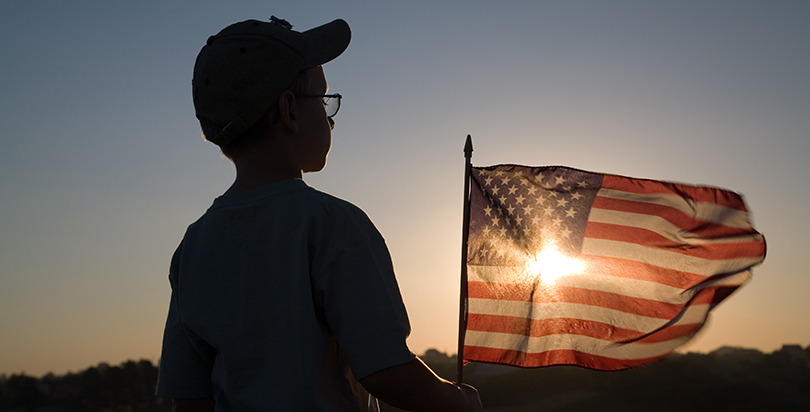Berner: How School Culture Drives Civic Knowledge and Shapes the Next Generation of Citizens

Political scientists often refer to four common measures of citizenship behavior: community service, civic skills, political knowledge, and political tolerance. These measures reflect a combination of knowledge about the democratic process, democratic capacities such as analyzing legislation and writing letters, and civic attachment, i.e., what are my obligations to this community and this nation?
The burden for instilling these does not rest upon schools alone, of course. Citizenship formation comes via many sources, including family, the media, and social networks. But schools are many students’ first and most sustained experience with civic institutions, and research finds that they exert an independent effect upon civic outcomes.
They have not been entirely successful. Nationally normed test scores indicate generalized, lackluster results: In 2014, only 23 percent of America’s eighth-graders — in public and private schools alike — scored proficient or higher on the National Assessment of Educational Progress’s civics test.
This means that most of our eighth-graders misinterpreted a graph on voter turnout and incorrectly answered such questions as the types of government in Canada, France, and Australia. Qualitative studies suggest that, for many students, citizenship amounts to little more than thin patriotism or mere good-neighborliness.
Interestingly, multiple studies that isolate the “school effect” find a civic advantage in attending private schools — particularly Catholic high schools. A new report from Cardus’s Religious Schools Initiative, led by David Sikkink at the University of Notre Dame, indicates that private school attendance exerts a long-term positive influence on one component of adult civic engagement: giving and volunteering.
Sikkink and Jonathan Schwartz’s research draws upon the Panel Study of Income Dynamics — “the longest running longitudinal household survey in the world” — which is now in its third generation of participants. The research team applied multiple controls, including socioeconomic status, family religiosity, and educational attainment, each of which independently influences philanthropic patterns. The findings are nuanced, but Cardus’s report finds that private schools seem to equip their graduates with identities and values that prompt adult voluntary activity beyond that of their public school peers.
Why? What are the precise mechanisms by which schools of any type foster citizenship behavior? Scholars disagree about which mechanisms matter most, but researchers believe that all of these have a role: social-capital creation, high expectations and rigorous academic programs, classroom environments that support deliberation and debate, strong normative school cultures, and school structures that engage parents. I want to focus for a moment upon the school culture aspect.
A strong school culture means something very different from a friendly school, or a high-achieving school, or a school with few discipline problems. Rather, it means a school where the moral vocabulary, rituals, discipline, academic expectations, and relationships align. Such a school can define its mission, hire faculty, and attract students and parents based upon a shared vision. Of course, no school does this perfectly — and some hardly do it at all. But this enterprise can also grow tall and deep and provide shared answers to the “Why?” questions that inevitably arise about, for instance, what constitutes ethical behavior.
Evidence from around the world suggests that studying within “distinctive educational communities in which pupils and teachers share a common ethos” vastly increases the odds of students acquiring academic and civic knowledge, skills, and sensibilities. Charles Glenn, professor emeritus of educational leadership and policy studies at Boston University, has observed that in European school systems (most of which fund religiously, philosophically, and pedagogically diverse schools) “schools with a distinctive identity … offer educational advantages deriving from their clarity of focus.” In a well-known study, Anthony Bryk and his co-authors found this same dynamic in American Catholic schools. Scott Seider also observed the benefits of strong normative culture in three very distinctive charter schools in Boston.
These findings suggests the possibility that effective democratic participation relies upon seeing ourselves as more than citizens, and that larger commitments and values inform civic engagement rather than the other way around. Put differently, the capacity and the desire to engage actively in citizenship behaviors cannot derive from the right to vote alone, nor the philanthropic imperative from a mere comprehension of civic institutions. Rather, the identities and values that prompt critique and voluntary activity and political action seem to be strengthened by recourse to richer claims about the human person and the just society.
Expanding access to private schools requires significant attention to equity, accountability, and funding; such programs solve some problems and raise new ones — as I discuss in depth elsewhere. However, well-constructed state support for a diverse array of private schools is more likely to help than to hinder our national capacity to nurture students’ civic growth. So might policies — as in the U.K. — that encourage a meaningful articulation of distinctive school cultures within the public school sector — such as the U.K. requires of its funded schools.
Ashley Berner is deputy director of the Johns Hopkins Institute for Education Policy and assistant professor at the School of Education. Palgrave Macmillan released her book Pluralism and American Education: No One Way to School last November.
Get stories like these delivered straight to your inbox. Sign up for The 74 Newsletter

;)
